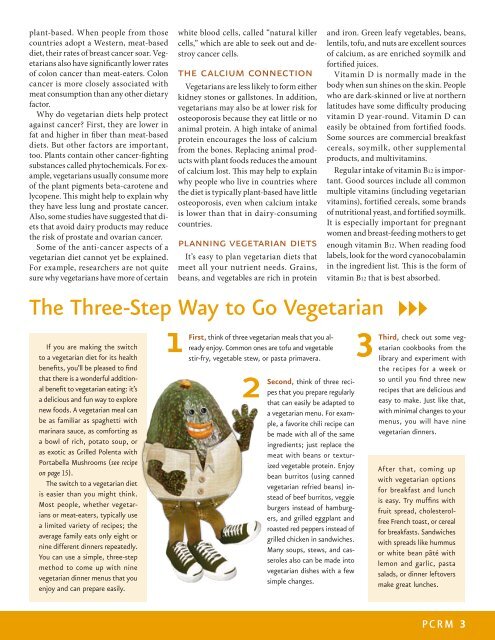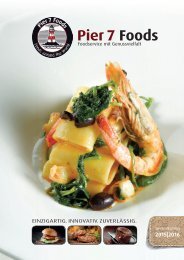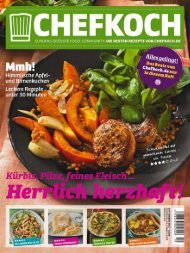testff
testfff
testfff
Create successful ePaper yourself
Turn your PDF publications into a flip-book with our unique Google optimized e-Paper software.
plant-based. When people from those<br />
countries adopt a Western, meat-based<br />
diet, their rates of breast cancer soar. Vegetarians<br />
also have significantly lower rates<br />
of colon cancer than meat-eaters. Colon<br />
cancer is more closely associated with<br />
meat consumption than any other dietary<br />
factor.<br />
Why do vegetarian diets help protect<br />
against cancer? First, they are lower in<br />
fat and higher in fiber than meat-based<br />
diets. But other factors are important,<br />
too. Plants contain other cancer-fighting<br />
substances called phytochemicals. For example,<br />
vegetarians usually consume more<br />
of the plant pigments beta-carotene and<br />
lycopene. This might help to explain why<br />
they have less lung and prostate cancer.<br />
Also, some studies have suggested that diets<br />
that avoid dairy products may reduce<br />
the risk of prostate and ovarian cancer.<br />
Some of the anti-cancer aspects of a<br />
vegetarian diet cannot yet be explained.<br />
For example, researchers are not quite<br />
sure why vegetarians have more of certain<br />
If you are making the switch<br />
to a vegetarian diet for its health<br />
benefits, you’ll be pleased to find<br />
that there is a wonderful additional<br />
benefit to vegetarian eating: it’s<br />
a delicious and fun way to explore<br />
new foods. A vegetarian meal can<br />
be as familiar as spaghetti with<br />
marinara sauce, as comforting as<br />
a bowl of rich, potato soup, or<br />
as exotic as Grilled Polenta with<br />
Portabella Mushrooms (see recipe<br />
on page 15).<br />
The switch to a vegetarian diet<br />
is easier than you might think.<br />
Most people, whether vegetarians<br />
or meat-eaters, typically use<br />
a limited variety of recipes; the<br />
average family eats only eight or<br />
nine different dinners repeatedly.<br />
You can use a simple, three-step<br />
method to come up with nine<br />
vegetarian dinner menus that you<br />
enjoy and can prepare easily.<br />
white blood cells, called “natural killer<br />
cells,” which are able to seek out and destroy<br />
cancer cells.<br />
the calcium connection<br />
Vegetarians are less likely to form either<br />
kidney stones or gallstones. In addition,<br />
vegetarians may also be at lower risk for<br />
osteoporosis because they eat little or no<br />
animal protein. A high intake of animal<br />
protein encourages the loss of calcium<br />
from the bones. Replacing animal products<br />
with plant foods reduces the amount<br />
of calcium lost. This may help to explain<br />
why people who live in countries where<br />
the diet is typically plant-based have little<br />
osteoporosis, even when calcium intake<br />
is lower than that in dairy-consuming<br />
countries.<br />
planning vegetarian diets<br />
It’s easy to plan vegetarian diets that<br />
meet all your nutrient needs. Grains,<br />
beans, and vegetables are rich in protein<br />
The Three-Step Way to Go Vegetarian<br />
First, think of three vegetarian meals that you already<br />
enjoy. Common ones are tofu and vegetable<br />
stir-fry, vegetable stew, or pasta primavera.<br />
Second, think of three recipes<br />
that you prepare regularly<br />
that can easily be adapted to<br />
a vegetarian menu. For example,<br />
a favorite chili recipe can<br />
be made with all of the same<br />
ingredients; just replace the<br />
meat with beans or texturized<br />
vegetable protein. Enjoy<br />
bean burritos (using canned<br />
vegetarian refried beans) instead<br />
of beef burritos, veggie<br />
burgers instead of hamburgers,<br />
and grilled eggplant and<br />
roasted red peppers instead of<br />
grilled chicken in sandwiches.<br />
Many soups, stews, and casseroles<br />
also can be made into<br />
vegetarian dishes with a few<br />
simple changes.<br />
and iron. Green leafy vegetables, beans,<br />
lentils, tofu, and nuts are excellent sources<br />
of calcium, as are enriched soymilk and<br />
fortified juices.<br />
Vitamin D is normally made in the<br />
body when sun shines on the skin. People<br />
who are dark-skinned or live at northern<br />
latitudes have some difficulty producing<br />
vitamin D year-round. Vitamin D can<br />
easily be obtained from fortified foods.<br />
Some sources are commercial breakfast<br />
cereals, soymilk, other supplemental<br />
products, and multivitamins.<br />
Regular intake of vitamin B12 is important.<br />
Good sources include all common<br />
multiple vitamins (including vegetarian<br />
vitamins), fortified cereals, some brands<br />
of nutritional yeast, and fortified soymilk.<br />
It is especially important for pregnant<br />
women and breast-feeding mothers to get<br />
enough vitamin B12. When reading food<br />
labels, look for the word cyanocobalamin<br />
in the ingredient list. This is the form of<br />
vitamin B12 that is best absorbed.<br />
Third, check out some vegetarian<br />
cookbooks from the<br />
library and experiment with<br />
the recipes for a week or<br />
so until you find three new<br />
recipes that are delicious and<br />
easy to make. Just like that,<br />
with minimal changes to your<br />
menus, you will have nine<br />
vegetarian dinners.<br />
After that, coming up<br />
with vegetarian options<br />
for breakfast and lunch<br />
is easy. Try muffins with<br />
fruit spread, cholesterolfree<br />
French toast, or cereal<br />
for breakfasts. Sandwiches<br />
with spreads like hummus<br />
or white bean pâté with<br />
lemon and garlic, pasta<br />
salads, or dinner leftovers<br />
make great lunches.<br />
PCRM 3

















